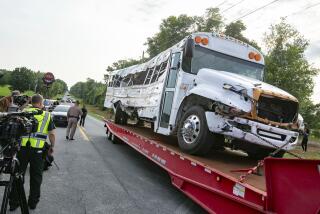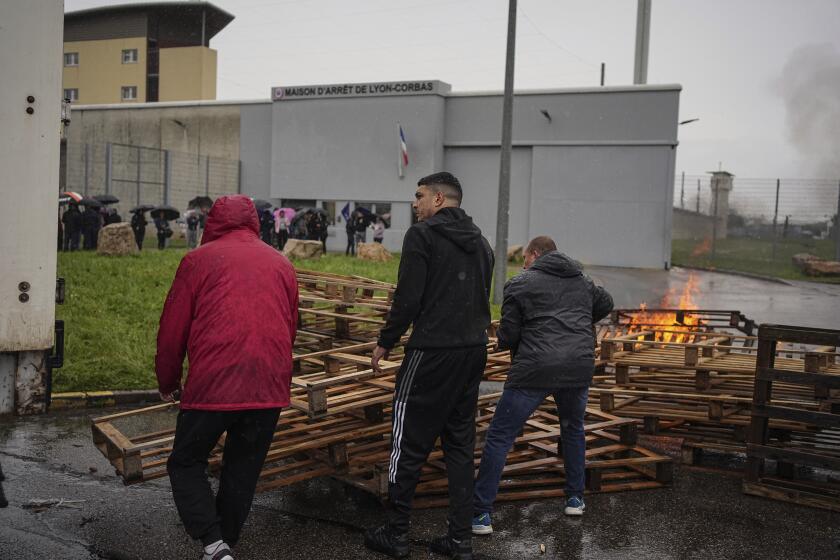Hussein’s Attorneys Refuse to Attend Hearing
Lawyers for Saddam Hussein and his codefendants refused to attend a special court hearing Sunday, citing worries about violence and the recent assassination of one of their colleagues.
The defense attorneys have demanded that the Iraqi government and U.S. forces let them deputize their own relatives and tribesmen as armed bodyguards before they agree to continue to take part in the trial, which began Wednesday.
Prosecutors interviewed a dying former intelligence officer Sunday in a private hospital in the presence of an investigative judge but without defense lawyers. They said they had offered the defense several ways to take part in the session.
The lead prosecutor said the witness testified against Hussein and his deputies in connection with charges stemming from the alleged revenge killing of 146 Shiite villagers in the town of Dujayl after a 1982 assassination attempt against Hussein.
The dispute over security came as bombs and shootings left at least nine Iraqis dead Sunday and cut off vital exports from Iraq’s northern oil fields. American troops have suffered at least 1,996 deaths since the U.S.-led invasion of Iraq in March 2003, and Associated Press reported that five were wounded in attacks in Baghdad on Sunday.
The discord concerning safety foreshadows the difficulties that may arise in conducting a sensational trial in one of the world’s most dangerous countries.
The spat over the hearing also shows how the two sides might duel in the media, as well as in the courtroom, before the next full court session Nov. 28.
The U.S.-backed government vows that the trial will continue.
“The government will not interfere in the judiciary process, but its duty is to provide these trials in order to provide justice for the people,” government spokesman Laith Kubba said Sunday. “We will not transfer the trial outside Iraq because all the resources are here. We want the people to sense justice.”
Defense attorneys say they can’t mount a proper defense for their clients in the current climate of insecurity. Saadoun Janabi, a lawyer for one of the defendants, was found dead Thursday with a pair of bullets in his head an hour after he was grabbed from his office by gunmen.
The killing of the 58-year-old attorney, who was defending the former head of Hussein’s Revolutionary Court, Awad Hamed Bandar, has sparked an uproar among defense lawyers, who have demanded an international investigation.
Kubba said the defense lawyers had rebuffed offers by the government of the same protections and security it has given other officers of the court. They rejected an offer to obscure lawyers’ faces during the trial and keep their names private, he said.
“We offered them security advice,” he told reporters. “If they ask for security, it’s our duty to provide it.”
Defense lawyers say they mistrust the Interior Ministry, which they say is infiltrated by Shiite militiamen who wish them harm.
“We do not know the people in the Ministry of Interior,” said Khamis Ubaidi, a veteran criminal lawyer who represents several of the defendants. “We want our relatives to protect us. We want the people in charge to issue licenses for them to carry weapons.”
Prosecutors on Sunday interviewed Wadah Ismail Sheik, a high-ranking intelligence official who is apparently dying of cancer, about the defendants’ involvement in the Dujayl case.
Lead prosecutor Jaafar Mousawi said the court had offered the dozen or so defense attorneys four ways to attend the session, including participation via video teleconference or the use of a U.S. military escort, but the defense refused.
Mousawi said the hearing went ahead Sunday and was recorded for possible introduction as evidence.
“They’re just being difficult,” he said in an interview.
Defense attorneys have already taken a disliking to the lead prosecutor. As the trial opened, he launched a lengthy attack against the crimes of the former regime that prompted at least two vocal objections from the other side of the courtroom.
“He wasn’t a prosecutor,” said Ubaidi, who has emerged as a spokesman for the defense. “He was like an enemy.”
Violence continued throughout the country Sunday. A car bomb in central Baghdad killed three Iraqis, including two police officers, and injured 13 others in one of the city’s busiest districts.
In Baqubah, 35 miles northeast of the capital, a police officer walking through the market was shot and killed in an ambush. In nearby Balad Ruz, gunmen assassinated a Shiite cleric.
In Tikrit, Hussein’s hometown, a police officer and his two sons were killed by a roadside bomb.
Car bombs and roadside explosives in downtown Kirkuk killed at least one person and wounded 11. Four bombs nearby targeted Iraq’s northern oil pipelines and cut off the flow of the country’s main export.
*
Staff writer Saif Rasheed, special correspondent Ali Windawi in Kirkuk and special correspondents in Baqubah and Tikrit contributed to this report.
More to Read
Start your day right
Sign up for Essential California for news, features and recommendations from the L.A. Times and beyond in your inbox six days a week.
You may occasionally receive promotional content from the Los Angeles Times.






